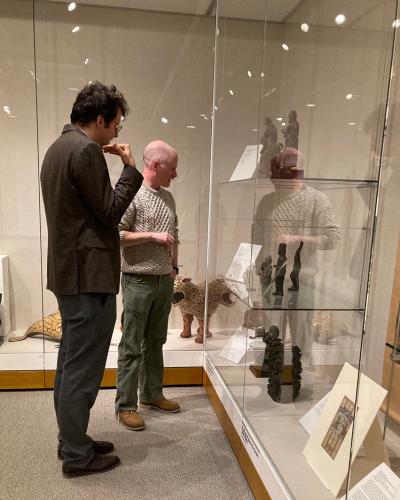Reflecting upon Invited Society Scholar Kathi Weeks's February 2020 lecture, Alena Williams, 2019-20 "Energy" Society Fellow, considers the potential "energetic" effects of the COVID-19 pandemic, especially around gendered domestic labor. Williams has developed a reading list of current scholarly and popular news sources to encourage a deep-dive into the meaning of "work" today.
Image: Cauleen Smith, Stop (detail), 2017. Textile, acrylic paint and embroidery. 62 x 48 1/2 inches. Courtesy the artist. Photo credit Tom V Ende.
Overview
During the isolation imposed by the COVID-19 pandemic, connections have unexpectedly persisted between persons, animals, and things. The sharp devaluation of oil in April 2020—the result of our collective “sheltering in place”—made it possible to imagine alternate energetic modes of living and working. But the question of whether this new perspective on contemporary life might engender a rethinking of our affective relations in the pandemic's wake has largely escaped the public imagination.
In a lecture entitled “Abolition of the Family: The Most Infamous Feminist Proposal” at the Cornell on February 18, 2020, political theorist Kathi Weeks reassessed late-twentieth-century second wave feminism’s critique of familial reproduction. Central to her lecture was an engagement with Canadian-American radical feminist Shulamith Firestone’s seminal 1970s publication The Dialectic of Sex: The Case for Feminist Revolution, which analogized the status of women to that of working class, shifting the Marxist frame of reference from production to reproduction and calling for the emancipation of women—and their bodies—from its burden. Yet, as Weeks argued, the familial unit continues to sustain itself with privatized social reproduction; married and unmarried "coupledom"; and genetically-centered kinship—social forms which significantly inhibit the novel reconfiguration of intimacy and shared experience.
The COVID-19 pandemic—and its remapping of familial, social, and working conditions—introduces a whole new set of concerns with respect to the fundamental energetic relation between the economy, subjectivity, and sociability. Over the past months, a range of articles have touched on these issues in different ways and to varying degrees of intensity—focusing on gender, class, and ethnicity; the following links are but a sampling.
—Alena J. Williams, Society Fellow 2019-20
Energy and Life-Work in the Covid-19 Pandemic: A Reading List
- Watch the Footprint of Coronavirus Spread Across Countries (New York Times)
- Women Are Bearing the Brunt of Coronavirus Disruption (Bloomberg)
- COVID-19: The Gendered Impacts of the Outbreak (The Lancet)
- The Losers Conspiracy: Paul B. Preciado on Life after COVID-19 (Artforum International)
- Putting A Gender Lens On COVID-19: Thought Leaders Weigh In (Forbes)
- Why the Coronavirus Seems to Hit Men Harder Than Women (New York Times)
- Coronavirus Is Killing the Working Mother (Rolling Stone)
- COVID-19 Has Hit Women Hard, Especially Working Mothers (University of Southern California News)
- How Covid-19 Is Changing Women’s Lives (BBC)
- COVID-19 Is a Perfect Storm for Women Workers (Working Class Perspectives)
- ‘Motherhood Penalty' May Fuel Workplace Lawsuits in Pandemic (1) (Bloomberg Law)
- Women’s Careers Could Take Long-Term Hit From Coronavirus Pandemic (Wall Street Journal)
- New Research Shows Covid-19’s Impact On Gender Inequality And Mothers’ Mental Health (Forbes)
- COVID-19 is the Biggest Setback to Gender Equality in a Decade (World Economic Forum)
- Opinion: In the Wake of COVID-19, Academia Needs New Solutions to Ensure Gender Equity (Proceedings of the National Academy of Sciences)





